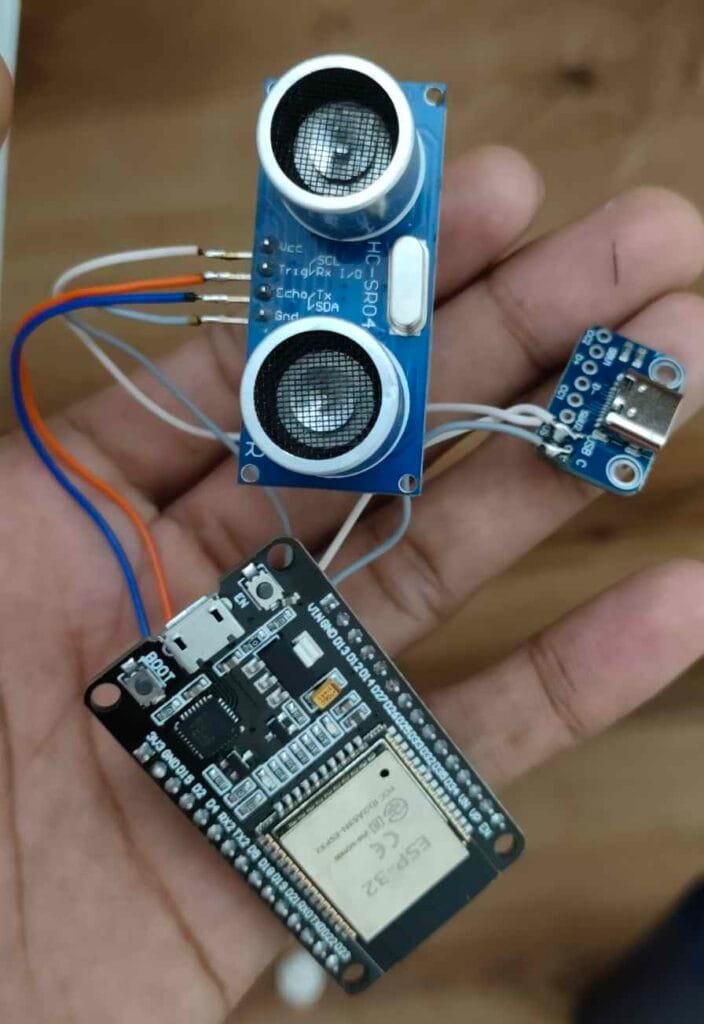Ever wanted to get a notification when someone enters your room? In this DIY project, we’ll show you how to build a smart intruder alert system using an ESP32, ultrasonic sensor, and Telegram—completely free, no third-party paid services!
🧰 Components Needed
- ESP32 Development Board (e.g., DOIT ESP32 DEVKIT V1)
- HC-SR04 Ultrasonic Sensor
- Jumper Wires
- USB Cable for ESP32
- WiFi connection
- Telegram App (for bot notifications)
🔌 Wiring Diagram
| HC-SR04 Pin | ESP32 Pin |
|---|---|
| VCC | 5V |
| GND | GND |
| Trig | D5 (GPIO5) |
| Echo | D18 (GPIO18) |
Note: While your ESP32 board might have D-labels (D1, D2, etc.), internally we use GPIO numbers in code.
📲 Telegram Bot Setup
- Open Telegram and search for
@BotFather - Send
/start, then/newbot - Name your bot and assign it a username (must end in
_bot) - Save the Bot Token provided
Get Your Chat ID
- Open this URL in your browser (replace
<TOKEN>):https://api.telegram.org/bot<TOKEN>/getUpdates - Send any message to your bot
- Refresh the page to find your chat ID in the JSON response:
"chat":{"id":12345678,...}
💻 Code for ESP32
#include <WiFi.h>
#include <WiFiClientSecure.h>
const char* ssid = "YOUR_WIFI_SSID";
const char* password = "YOUR_WIFI_PASSWORD";
String botToken = "YOUR_BOT_TOKEN";
String chatID = "YOUR_CHAT_ID";
#define trigPin 5
#define echoPin 18
WiFiClientSecure client;
void setup() {
Serial.begin(115200);
pinMode(trigPin, OUTPUT);
pinMode(echoPin, INPUT);
WiFi.begin(ssid, password);
Serial.print("Connecting to WiFi");
while (WiFi.status() != WL_CONNECTED) {
delay(500);
Serial.print(".");
}
Serial.println("\nConnected!");
client.setInsecure(); // Skip SSL certificate validation
}
void loop() {
long duration;
float distance;
// Trigger ultrasonic sensor
digitalWrite(trigPin, LOW);
delayMicroseconds(2);
digitalWrite(trigPin, HIGH);
delayMicroseconds(10);
digitalWrite(trigPin, LOW);
duration = pulseIn(echoPin, HIGH);
distance = duration * 0.034 / 2;
Serial.print("Distance: ");
Serial.println(distance);
if (distance < 50) {
sendTelegramMessage("🚨 Someone just entered in your room!");
delay(10000); // Wait 10 sec before next message
}
delay(500);
}
void sendTelegramMessage(String message) {
if (WiFi.status() == WL_CONNECTED) {
if (client.connect("api.telegram.org", 443)) {
String url = "/bot" + botToken + "/sendMessage?chat_id=" + chatID + "&text=" + message;
client.print(String("GET ") + url + " HTTP/1.1\r\n" +
"Host: api.telegram.org\r\n" +
"Connection: close\r\n\r\n");
delay(500);
}
}
}
🎯 How It Works
- The ultrasonic sensor continuously checks the distance in front of it.
- If the distance is less than 50 cm, it assumes someone entered the room.
- It sends a message via the Telegram Bot API directly to your Telegram app.
- There’s a 10-second cooldown to prevent spamming.
💡 Real-World Applications
- Room intrusion alert
- Baby movement detection
- Office security
- Pet activity monitoring
- Motion-triggered automation
🧪 Tips and Enhancements
- 📏 Fine-tune the distance threshold (
if (distance < 50)) based on your setup - ⏱️ Use multiple readings and averaging to reduce false alerts
- 💡 Add LED or buzzer for local alerts
- 📷 Integrate with ESP32-CAM to send photos
- 🕐 Add time-based filters (e.g., only notify at night)
output:




I really enjoy reading on this site, it has got excellent posts.